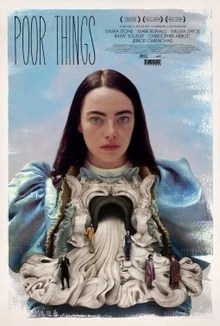In the vast expanse of cinematic storytelling, some films transcend mere entertainment, delving deep into the layers of societal constructs, norms, and the human condition. There are not many movies that I get caught up in and praise at every chance I can, and “Poor Things” stands proudly among those, offering a fantastical lens through which to examine the intricacies of our world. Directed by visionary filmmakers (Yorgos Lanthimos) and featuring a stellar cast, this futuristic fantasy is not just a tale of imagination but a poignant commentary on the reality we inhabit.
I am often accused of seeing more than what might be there, and at the heart of “Poor Things” lies a profound exploration of how societal norms shape our perceptions and interactions. One of the most resonant quotes from the movie encapsulates this theme perfectly: (Bella Baxter) “As God, my father, says, it is only that way until we discover the new way it is, and then that is the way it is until we discover the new way it is.”
This profound statement reflects the ever-evolving nature of our understanding of the world. It reminds us that what we perceive as immutable truths are often nothing more than constructs waiting to be dismantled by the light of new knowledge.
Throughout the film, we are confronted with characters who challenge the status quo and dare to question the established order of things. Bella Baxter, portrayed with captivating depth by the talented Emma Stone (Best Actress, Academy Awards 2024), is a beacon of this defiance. Her journey from a seemingly meek and submissive woman to a force to be reckoned with mirrors the struggles of individuals who refuse to conform to societal expectations.
One cannot discuss “Poor Things” without delving into its portrayal of power dynamics and societal hierarchies. The film deftly navigates these themes, exposing the inequalities that pervade our world. Whether it’s the exploitation of the marginalized by the powerful, the insidious ways in which privilege is maintained or the minimized role women play, “Poor Things” holds a mirror to our own reality, forcing us to confront uncomfortable truths.
Moreover, the film’s fantastical elements serve not only as a means of escapism but also as a powerful tool for social commentary. In a world where the lines between reality and fantasy blur, “Poor Things” invites us to question the very fabric of our existence. It challenges us to imagine a world where the impossible becomes possible, where the rules that govern our lives are subject to change.
As we journey through the intricate tapestry of “Poor Things,” we are reminded that the world is far more complex and nuanced than we often realize. It is a world where the only constant is change, where the only certainty is uncertainty. And yet, within this uncertainty lies the opportunity for growth, for evolution, for progress.
“Poor Things” is more than just a movie; it is a profound meditation on the nature of humanity and the societies we create. It challenges us to look beyond the surface, question the norms governing our lives, and imagine a world where anything is possible.
As we navigate our own reality, let us heed the words of Bella Baxter and embrace the ever-changing nature of the world around us. Only then can we truly discover the new way it is and pave the path towards a brighter, more equitable future.
It’s challenging to pick quotable quotes, as so many resonated. However, here are a few more to ponder over.
Godfrey Wicker: “Society is a madhouse, Bella, and it is we who are the lunatics.”
This quote challenges the idea of normalcy and sanity, suggesting that perhaps society’s structures are flawed rather than those who don’t fit within them.
Bella Baxter: “The world is full of ghosts, Henry, and sometimes they are the ones we love the most.”
This poignant statement speaks to the invisible forces that shape our lives, whether societal expectations, past traumas, or the lingering presence of loved ones.
Dr. Archibald McCandless: “Progress comes from questioning, Bella. Questioning authority, questioning tradition, questioning everything we’ve ever been told.”
Dr. McCandless’s words highlight the importance of critical thinking and skepticism in challenging the status quo and driving societal change.
Dr. Godwin Baxter: “History is written by the victors, Bella. But it is rewritten by the truth-seekers.”
This quote underscores the idea that the narratives we inherit are often biased and incomplete, and we must uncover the deeper truths beneath the surface.
“Poor Things” is fun and thought-provoking, at least for me.
Have you seen it?
What are your thoughts?
Share a quote that resonated with you. I would love to hear what you heard and saw within this beautiful, somewhat misunderstood movie.
It is a wonder-filled world, and we get to play in it. How cool is that!
Many blessings,

More about Poor Things, the movie, and the book that inspired the movie.


